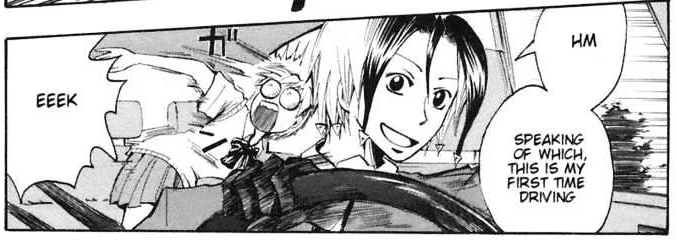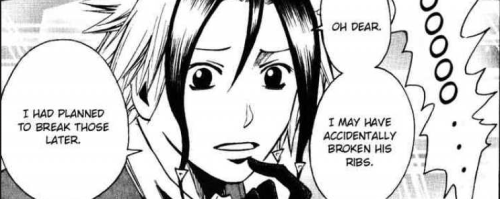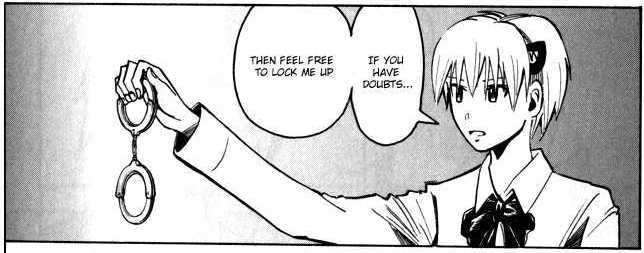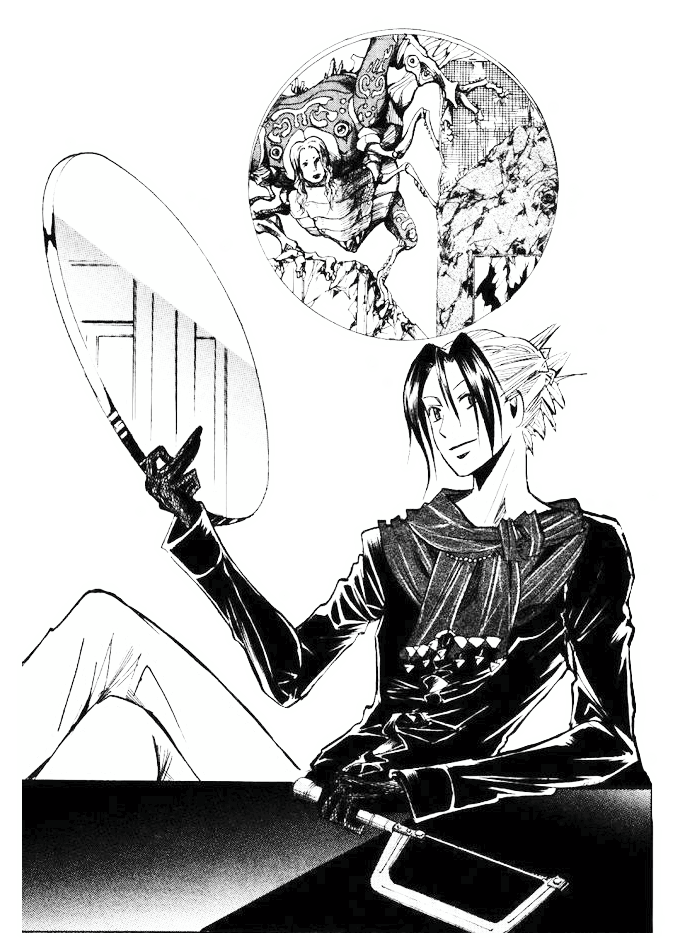Majin Tantei Nougami Neuro (MTNN) is a supernatural mystery manga
written by Matsui Yuusei, published in Weekly Shonen Jump from 2005 to
2009. It was Yuusei's first original work and ran for a grand total of
202 chapters. It was also adapted into a 25-episode anime in 2007, but
the anime radically changed the storyline and created an original ending
that didn't reflect the manga. (I've personally only seen a few episodes
of the anime.)
I was introduced to Matsui Yuusei's work through Assassination Classroom
first, and I absolutely adored that series from beginning to end. After
I finished it, the same friend who recommended it told me that the same
author had an older series that I might also like. This was way back in
2015, and I've read through MTNN every few years since I read it for the
first time back then. It's one of my absolute favorite pieces of niche media,
and I'm amazed that it's taken me this long to talk about it on this
website.
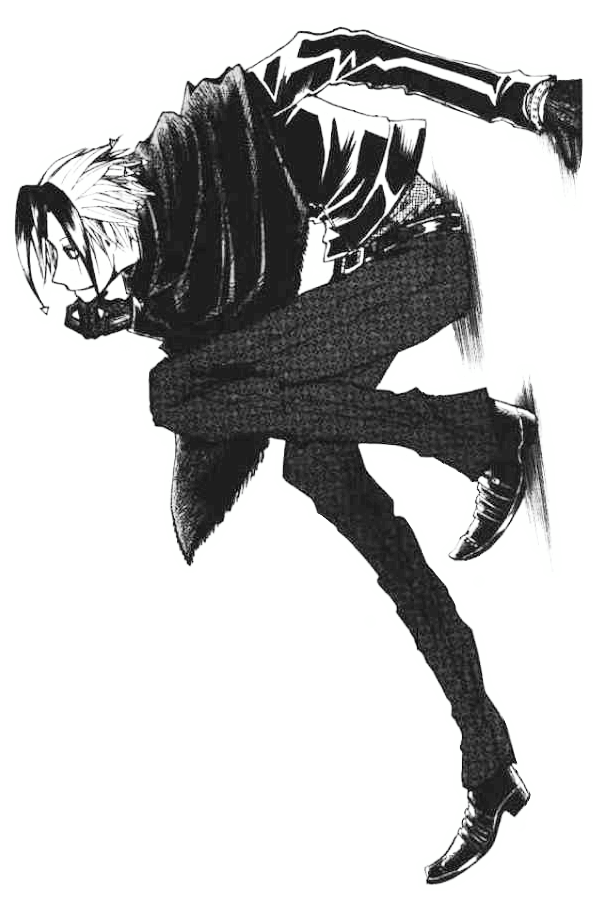

Majin Tantei Nougamu Neuro opens with Katsuragi Yako, a high-school
girl, trying to cope with her father's murder. The police, unable to
find the culprit, label it a cold case. However, a mysterious demon
named Neuro suddenly appears before her, demanding that she accompy him
and serve as his camouflage
in the human world as he hunts for 'riddles' to consume. Neuro turns
Yako into somewhat of an icon, a famous schoolgirl detective, while
solving the murders behind the scenes and feeding off of the guilty
culprits'
emotions.
That in and of itself is a pretty engaging plot, but there's a lot more
to this series than just the superficial summary. MTNN is a very strange
manga, and if you've read Assassination Classroom before, you'll be
aware of how Matsui Yuusei uses dark themes and monstrous, allegorical
imagery to creatively develop characters and showcase their innermost
desires. In Assassination Classroom, he uses themes of murder and
bloodlust, while in MTNN, a large recurring theme is (unrealistic)
BDSM imagery. Neuro is a demon with a penchant for cruel and unusual
punishments, and since Yako is his assistant, a lot of these punishments
befall her (though Neuro has no qualms torturing his other subordinates
as well). Neuro takes great joy in devising methods of torturing the
poor girl, and many of them are played for absurd, exaggerated laughs.

Something
interesting happens, however, as the story and the characters develop,
and that is the transition from Neuro's slapstick punishments being
presented as entirely comedic to a genuinely important aspect of his
partnership with Yako. It happens slowly, but the series eventually
reaches a point where physical restraints and emotional 'training' are
methods for Yako and Neuro to communicate candidly with each other. Like
bloodlust in Assassination Classroom being praised as an allegory for
hard work and desire, Majin Tantei Nougami Neuro uses exaggerated BDSM
to showcase Yako and Neuro's trust in each other as partners when faced
with potentially deadly threats. I think the key to this unusual
symbolism's success is the fact that Yuusei makes it clear that there
are no sexual or romantic undertones between Neuro and Yako at all, so
he's able to use this imagery effectively without the metaphor getting
muddled.
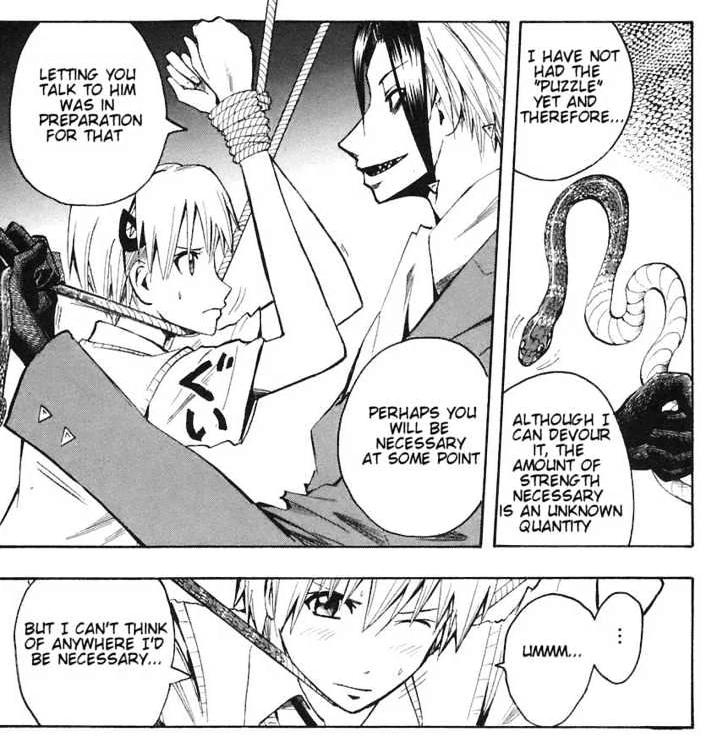
Yuusei also uses very interesting visual symbolism when it comes to the
murderers. MTNN starts out as a bit of a 'villain of the week' manga,
with Neuro and Yako being given a case and trying to track down the
guilty party. Once they determine who the culprit is, the culprit often
has a symbolic shift in their design, drawing on symbols related to their
personal beliefs or crimes. They go from average, everyday people to
grotesque caricatures, twisted by the way they justify their actions to
themselves and the detectives who've caught them in the act. Yuusei's
art may not be the best when it comes to drawing humans - there are a
lot of examples of yaoi and CLAMP anatomy throughout the manga - but his
artistic vision is really fascinating.
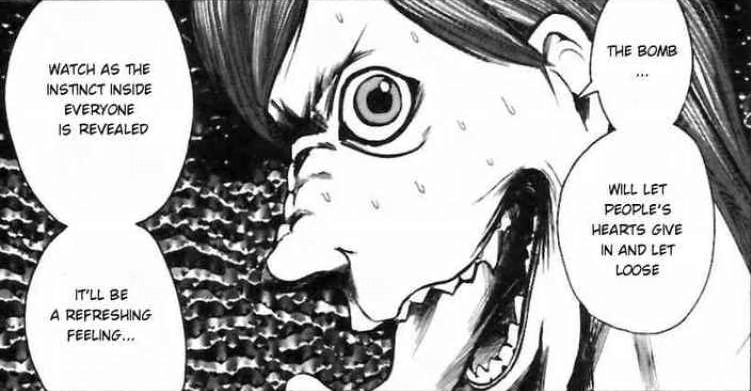
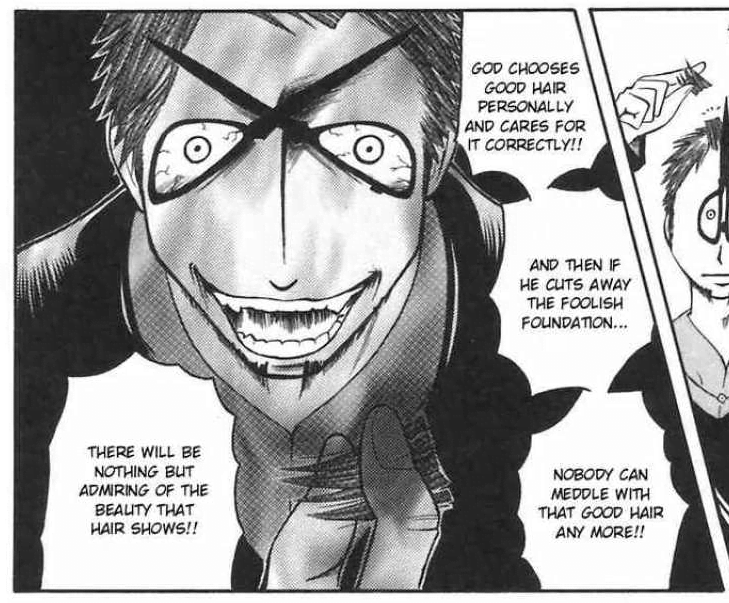
MTNN does have its fair share of humor that just hasn't aged well, for a
multitude of reasons, but the overall product is really fascinating and
I like it a lot. It's also very much a hit or miss manga, I think - you
will either love it and stick around to the very end, or you won't mesh
with the themes that Yuusei employs and/or you'll get turned away by the
uncomfortable and cringe humor. Which is totally valid! It's definitely
not for everyone, but I think about it a lot. I'm gearing up for what I
believe is my fourth read through of the manga very soon. I last read it
in October of 2020.
As the series goes on, it digs into some fascinating concepts regarding
crime, identity, and self-confidence. It also has the honor of being the
very first manga/anime that had a villain who legitimately terrified me
and caused me panic while I was reading it. It covers quite a lot of
ground over the course of its run, and I'm quite excited to visit it
again - I seem to discover or absorb something new every time I read it.
I may end up adding more to this page once I re-read the manga again. It
was never officially released in English, so there are some translated chapters
that are... of a lower quality than others. I would really love one day
to work on re-releasing some chapters, but I don't have a good enough
grasp of the language to do that. T_T Oh well. Anyway, I'll end this
page with some panels I screenshotted last time I read it, as well as a
transparent I made of one of my favorite chapter covers!
